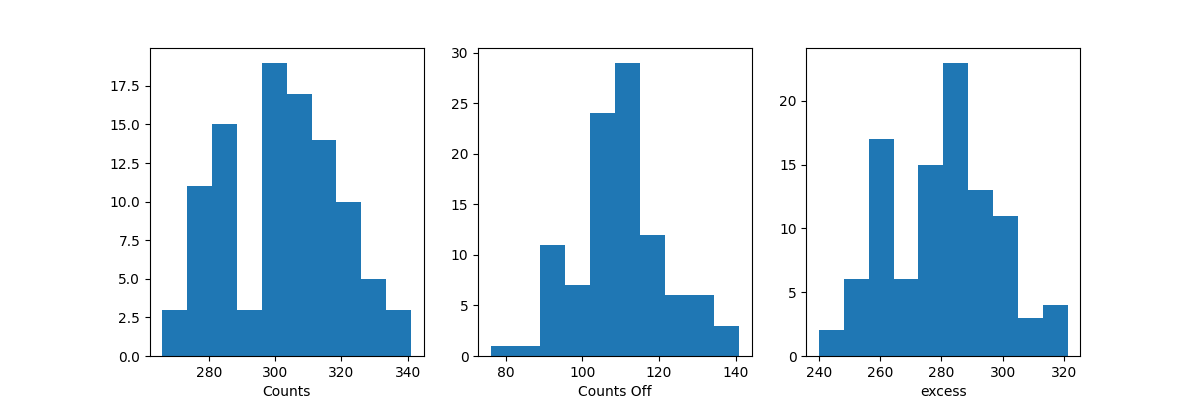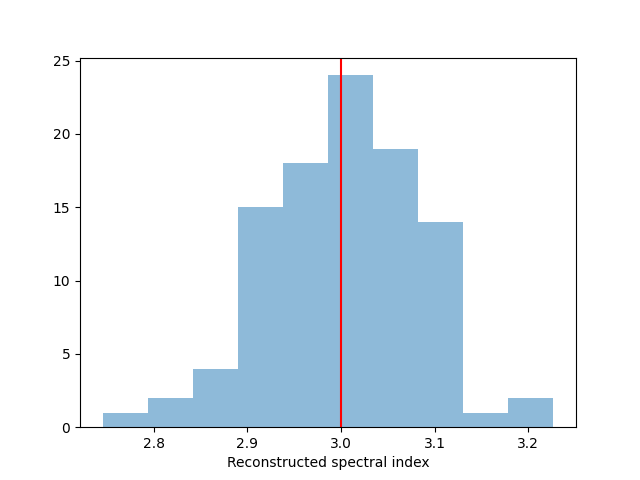Note
Go to the end to download the full example code. or to run this example in your browser via Binder
1D spectrum simulation#
Simulate a number of spectral on-off observations of a source with a power-law spectral model using the CTA 1DC response and fit them with the assumed spectral model.
Prerequisites#
Knowledge of spectral extraction and datasets used in gammapy, see for instance the spectral analysis tutorial
Context#
To simulate a specific observation, it is not always necessary to simulate the full photon list. For many uses cases, simulating directly a reduced binned dataset is enough: the IRFs reduced in the correct geometry are combined with a source model to predict an actual number of counts per bin. The latter is then used to simulate a reduced dataset using Poisson probability distribution.
This can be done to check the feasibility of a measurement, to test whether fitted parameters really provide a good fit to the data etc.
Here we will see how to perform a 1D spectral simulation of a CTAO observation, in particular, we will generate OFF observations following the template background stored in the CTAO IRFs.
Objective: simulate a number of spectral ON-OFF observations of a source with a power-law spectral model with CTAO using the CTA 1DC response, fit them with the assumed spectral model and check that the distribution of fitted parameters is consistent with the input values.
Proposed approach#
We will use the following classes and functions:
import numpy as np
import astropy.units as u
from astropy.coordinates import Angle, SkyCoord
from regions import CircleSkyRegion
# %matplotlib inline
import matplotlib.pyplot as plt
Setup#
from IPython.display import display
from gammapy.data import FixedPointingInfo, Observation, observatory_locations
from gammapy.datasets import Datasets, SpectrumDataset, SpectrumDatasetOnOff
from gammapy.irf import load_irf_dict_from_file
from gammapy.makers import SpectrumDatasetMaker
from gammapy.maps import MapAxis, RegionGeom
from gammapy.modeling import Fit
from gammapy.modeling.models import PowerLawSpectralModel, SkyModel
Check setup#
from gammapy.utils.check import check_tutorials_setup
check_tutorials_setup()
System:
python_executable : /Users/mregeard/Workspace/dev/code/gammapy/gammapy/.tox/build_docs/bin/python
python_version : 3.11.10
machine : x86_64
system : Darwin
Gammapy package:
version : 1.3.dev1205+g00f44f94ac
path : /Users/mregeard/Workspace/dev/code/gammapy/gammapy/.tox/build_docs/lib/python3.11/site-packages/gammapy
Other packages:
numpy : 1.26.4
scipy : 1.14.1
astropy : 5.2.2
regions : 0.10
click : 8.1.7
yaml : 6.0.2
IPython : 8.28.0
jupyterlab : not installed
matplotlib : 3.9.2
pandas : not installed
healpy : 1.17.3
iminuit : 2.30.1
sherpa : 4.16.1
naima : 0.10.0
emcee : 3.1.6
corner : 2.2.2
ray : 2.37.0
Gammapy environment variables:
GAMMAPY_DATA : /Users/mregeard/Workspace/dev/code/gammapy/gammapy-data/
Simulation of a single spectrum#
To do a simulation, we need to define the observational parameters like
the livetime, the offset, the assumed integration radius, the energy
range to perform the simulation for and the choice of spectral model. We
then use an in-memory observation which is convolved with the IRFs to
get the predicted number of counts. This is Poisson fluctuated using
the fake() to get the simulated counts for each observation.
# Define simulation parameters parameters
livetime = 1 * u.h
pointing_position = SkyCoord(0, 0, unit="deg", frame="galactic")
# We want to simulate an observation pointing at a fixed position in the sky.
# For this, we use the `FixedPointingInfo` class
pointing = FixedPointingInfo(
fixed_icrs=pointing_position.icrs,
)
offset = 0.5 * u.deg
# Reconstructed and true energy axis
energy_axis = MapAxis.from_edges(
np.logspace(-0.5, 1.0, 10), unit="TeV", name="energy", interp="log"
)
energy_axis_true = MapAxis.from_edges(
np.logspace(-1.2, 2.0, 31), unit="TeV", name="energy_true", interp="log"
)
on_region_radius = Angle("0.11 deg")
center = pointing_position.directional_offset_by(
position_angle=0 * u.deg, separation=offset
)
on_region = CircleSkyRegion(center=center, radius=on_region_radius)
# Define spectral model - a simple Power Law in this case
model_simu = PowerLawSpectralModel(
index=3.0,
amplitude=2.5e-12 * u.Unit("cm-2 s-1 TeV-1"),
reference=1 * u.TeV,
)
print(model_simu)
# we set the sky model used in the dataset
model = SkyModel(spectral_model=model_simu, name="source")
PowerLawSpectralModel
type name value unit error min max frozen link prior
---- --------- ---------- -------------- --------- --- --- ------ ---- -----
index 3.0000e+00 0.000e+00 nan nan False
amplitude 2.5000e-12 cm-2 s-1 TeV-1 0.000e+00 nan nan False
reference 1.0000e+00 TeV 0.000e+00 nan nan True
Load the IRFs In this simulation, we use the CTA-1DC IRFs shipped with Gammapy.
irfs = load_irf_dict_from_file(
"$GAMMAPY_DATA/cta-1dc/caldb/data/cta/1dc/bcf/South_z20_50h/irf_file.fits"
)
location = observatory_locations["cta_south"]
obs = Observation.create(
pointing=pointing,
livetime=livetime,
irfs=irfs,
location=location,
)
print(obs)
/Users/mregeard/Workspace/dev/code/gammapy/gammapy/.tox/build_docs/lib/python3.11/site-packages/astropy/units/core.py:2097: UnitsWarning: '1/s/MeV/sr' did not parse as fits unit: Numeric factor not supported by FITS If this is meant to be a custom unit, define it with 'u.def_unit'. To have it recognized inside a file reader or other code, enable it with 'u.add_enabled_units'. For details, see https://docs.astropy.org/en/latest/units/combining_and_defining.html
warnings.warn(msg, UnitsWarning)
Observation
obs id : 0
tstart : 51544.00
tstop : 51544.04
duration : 3600.00 s
pointing (icrs) : 266.4 deg, -28.9 deg
deadtime fraction : 0.0%
Simulate a spectra
# Make the SpectrumDataset
geom = RegionGeom.create(region=on_region, axes=[energy_axis])
dataset_empty = SpectrumDataset.create(
geom=geom, energy_axis_true=energy_axis_true, name="obs-0"
)
maker = SpectrumDatasetMaker(selection=["exposure", "edisp", "background"])
dataset = maker.run(dataset_empty, obs)
# Set the model on the dataset, and fake
dataset.models = model
dataset.fake(random_state=42)
print(dataset)
SpectrumDataset
---------------
Name : obs-0
Total counts : 298
Total background counts : 22.29
Total excess counts : 275.71
Predicted counts : 303.66
Predicted background counts : 22.29
Predicted excess counts : 281.37
Exposure min : 2.53e+08 m2 s
Exposure max : 1.77e+10 m2 s
Number of total bins : 9
Number of fit bins : 9
Fit statistic type : cash
Fit statistic value (-2 log(L)) : -1811.58
Number of models : 1
Number of parameters : 3
Number of free parameters : 2
Component 0: SkyModel
Name : source
Datasets names : None
Spectral model type : PowerLawSpectralModel
Spatial model type :
Temporal model type :
Parameters:
index : 3.000 +/- 0.00
amplitude : 2.50e-12 +/- 0.0e+00 1 / (cm2 s TeV)
reference (frozen): 1.000 TeV
You can see that background counts are now simulated
On-Off analysis#
To do an on off spectral analysis, which is the usual science case, the
standard would be to use SpectrumDatasetOnOff, which uses the
acceptance to fake off-counts. Please also refer to the Dataset simulations
section in the Spectral analysis with energy-dependent directional cuts tutorial,
dealing with simulations based on observations of real off counts.
dataset_on_off = SpectrumDatasetOnOff.from_spectrum_dataset(
dataset=dataset, acceptance=1, acceptance_off=5
)
dataset_on_off.fake(npred_background=dataset.npred_background())
print(dataset_on_off)
SpectrumDatasetOnOff
--------------------
Name : 8gaBuRdL
Total counts : 286
Total background counts : 20.20
Total excess counts : 265.80
Predicted counts : 301.27
Predicted background counts : 19.90
Predicted excess counts : 281.37
Exposure min : 2.53e+08 m2 s
Exposure max : 1.77e+10 m2 s
Number of total bins : 9
Number of fit bins : 9
Fit statistic type : wstat
Fit statistic value (-2 log(L)) : 7.06
Number of models : 1
Number of parameters : 3
Number of free parameters : 2
Component 0: SkyModel
Name : source
Datasets names : None
Spectral model type : PowerLawSpectralModel
Spatial model type :
Temporal model type :
Parameters:
index : 3.000 +/- 0.00
amplitude : 2.50e-12 +/- 0.0e+00 1 / (cm2 s TeV)
reference (frozen): 1.000 TeV
Total counts_off : 101
Acceptance : 9
Acceptance off : 45
You can see that off counts are now simulated as well. We now simulate several spectra using the same set of observation conditions.
n_obs = 100
datasets = Datasets()
for idx in range(n_obs):
dataset_on_off.fake(random_state=idx, npred_background=dataset.npred_background())
dataset_fake = dataset_on_off.copy(name=f"obs-{idx}")
dataset_fake.meta_table["OBS_ID"] = [idx]
datasets.append(dataset_fake)
table = datasets.info_table()
display(table)
name counts excess sqrt_ts background npred ... stat_sum counts_off acceptance acceptance_off alpha
...
------ ------ ------ ------------------ ------------------ ------------------ ... ----------------- ---------- ---------- ----------------- -------------------
obs-0 317 298.6 27.08240194504323 18.400000000000002 68.16666666666667 ... 738.7245908429609 92 9.0 45.0 0.2
obs-1 275 253.0 23.76785365487285 22.0 64.16666666666669 ... 575.779512784738 110 9.0 45.0 0.2
obs-2 293 272.4 25.17110555404655 20.6 66.0 ... 645.4993824075303 103 9.0 45.0 0.2
obs-3 280 257.6 23.982951737405354 22.4 65.33333333333334 ... 585.9241546985872 112 9.0 45.00000000000001 0.19999999999999998
obs-4 337 316.4 27.682709945184747 20.6 73.33333333333334 ... 787.314723949448 103 9.0 45.0 0.2
obs-5 283 258.6 23.727154782347895 24.400000000000002 67.50000000000001 ... 574.8525737727499 122 9.0 45.0 0.2
obs-6 330 307.6 26.889184475727866 22.400000000000006 73.66666666666667 ... 734.2414755285937 112 9.0 44.99999999999999 0.20000000000000004
obs-7 283 257.2 23.43087974795853 25.8 68.66666666666667 ... 552.3698779448044 129 9.0 45.0 0.2
obs-8 308 284.6 25.42049273328331 23.400000000000002 70.83333333333334 ... 652.2621572567633 117 9.0 45.0 0.2
obs-9 299 278.6 25.57085071486863 20.4 66.83333333333334 ... 666.9062670260786 102 9.0 45.00000000000001 0.19999999999999998
obs-10 310 294.8 27.488972161356774 15.2 64.33333333333334 ... 768.5404492529331 76 9.0 45.00000000000001 0.19999999999999998
obs-11 285 261.0 23.933833745454685 24.000000000000004 67.50000000000001 ... 583.448753292733 120 9.0 44.99999999999999 0.20000000000000004
obs-12 299 278.0 25.4325263895117 21.000000000000004 67.33333333333336 ... 655.2768246480357 105 9.0 44.99999999999999 0.20000000000000004
obs-13 309 287.4 25.877406235012618 21.6 69.50000000000001 ... 672.355748274336 108 9.0 45.0 0.2
obs-14 320 297.4 26.28282602819255 22.599999999999998 72.16666666666667 ... 697.5949745415169 113 9.0 45.00000000000001 0.19999999999999998
obs-15 283 261.0 24.25408979304137 22.0 65.50000000000001 ... 592.8754563739889 110 9.0 45.0 0.2
obs-16 298 273.8 24.664218201697352 24.200000000000003 69.83333333333336 ... 619.2584188386805 121 9.0 45.0 0.2
obs-17 301 272.8 24.01180151925227 28.200000000000003 73.66666666666667 ... 588.4976379504056 141 9.0 45.0 0.2
obs-18 311 289.2 25.947476976949815 21.8 70.0 ... 682.6250308750984 109 9.0 45.0 0.2
obs-19 280 257.6 23.982951737405376 22.400000000000002 65.33333333333334 ... 590.9995649814329 112 9.0 45.0 0.2
obs-20 327 304.2 26.63324286828024 22.800000000000004 73.50000000000003 ... 720.4840155823279 114 9.0 44.99999999999999 0.20000000000000004
obs-21 286 266.8 25.08332073068164 19.2 63.66666666666668 ... 637.0646310076313 96 9.0 45.00000000000001 0.19999999999999998
... ... ... ... ... ... ... ... ... ... ... ...
obs-78 337 314.4 27.23331180179332 22.6 75.00000000000001 ... 750.4026293749382 113 9.0 45.0 0.2
obs-79 315 294.6 26.4957236283439 20.4 69.5 ... 711.0546046139739 102 9.0 45.00000000000001 0.19999999999999998
obs-80 304 282.8 25.67868740385823 21.200000000000003 68.33333333333336 ... 669.9654389755506 106 9.0 44.99999999999999 0.20000000000000004
obs-81 301 281.6 25.922347414834622 19.400000000000002 66.33333333333334 ... 678.9813616402096 97 9.0 45.0 0.2
obs-82 280 258.0 24.072587044084237 22.000000000000004 65.0 ... 581.8610083160877 110 9.0 44.99999999999999 0.20000000000000004
obs-83 303 280.8 25.394928282299105 22.200000000000003 69.00000000000001 ... 654.4650896470343 111 9.0 44.99999999999999 0.20000000000000004
obs-84 269 247.8 23.580247140026987 21.200000000000003 62.500000000000014 ... 577.2362891766269 106 9.0 44.99999999999999 0.20000000000000004
obs-85 297 274.6 24.998935845735573 22.4 68.16666666666667 ... 631.6298361198053 112 9.0 45.00000000000001 0.19999999999999998
obs-86 286 268.2 25.42340896951546 17.800000000000004 62.50000000000001 ... 655.2082535886425 89 9.0 44.99999999999999 0.20000000000000004
obs-87 333 313.2 27.646851451147217 19.8 72.00000000000001 ... 770.1313412321031 99 9.0 45.0 0.2
obs-88 315 296.8 27.0172059251097 18.200000000000003 67.66666666666669 ... 734.6476098262428 91 9.0 44.99999999999999 0.20000000000000004
obs-89 287 265.0 24.49456558680515 22.000000000000004 66.16666666666667 ... 611.2334063685089 110 9.0 44.99999999999999 0.20000000000000004
obs-90 286 267.0 25.131221887043438 19.000000000000004 63.50000000000001 ... 635.8304116110406 95 9.0 44.99999999999999 0.20000000000000004
obs-91 285 259.8 23.67754591931069 25.200000000000003 68.50000000000001 ... 573.3564742963381 126 9.0 45.0 0.2
obs-92 313 289.4 25.664935420194176 23.6 71.83333333333336 ... 669.4496142825196 118 9.0 45.0 0.2
obs-93 302 283.2 26.123867522605497 18.8 66.00000000000001 ... 700.5066738339824 94 9.0 45.0 0.2
obs-94 322 300.2 26.574029757473202 21.8 71.83333333333334 ... 715.2570498037147 109 9.0 45.0 0.2
obs-95 305 280.6 25.030731260493152 24.400000000000006 71.16666666666667 ... 643.2846879404793 122 9.0 44.99999999999999 0.20000000000000004
obs-96 301 277.4 24.969845969421428 23.6 69.83333333333334 ... 626.7396842428624 118 9.0 45.0 0.2
obs-97 290 271.2 25.417982194454826 18.8 64.00000000000001 ... 650.9762484493856 94 9.0 45.0 0.2
obs-98 301 280.6 25.687832964675007 20.400000000000002 67.16666666666667 ... 664.5620099404952 102 9.0 45.0 0.2
obs-99 323 302.2 26.85707842376871 20.8 71.16666666666669 ... 733.1576598768017 104 9.0 45.0 0.2
Length = 100 rows
Before moving on to the fit let’s have a look at the simulated observations.

Now, we fit each simulated spectrum individually
results = []
fit = Fit()
for dataset in datasets:
dataset.models = model.copy()
result = fit.optimize(dataset)
results.append(
{
"index": result.parameters["index"].value,
"amplitude": result.parameters["amplitude"].value,
}
)
We take a look at the distribution of the fitted indices. This matches very well with the spectrum that we initially injected.
fig, ax = plt.subplots()
index = np.array([_["index"] for _ in results])
ax.hist(index, bins=10, alpha=0.5)
ax.axvline(x=model_simu.parameters["index"].value, color="red")
ax.set_xlabel("Reconstructed spectral index")
print(f"index: {index.mean()} += {index.std()}")
plt.show()

index: 3.0036925550377753 += 0.08081469527631224
Exercises#
Change the observation time to something longer or shorter. Does the observation and spectrum results change as you expected?
Change the spectral model, e.g. add a cutoff at 5 TeV, or put a steep-spectrum source with spectral index of 4.0
Simulate spectra with the spectral model we just defined. How much observation duration do you need to get back the injected parameters?
